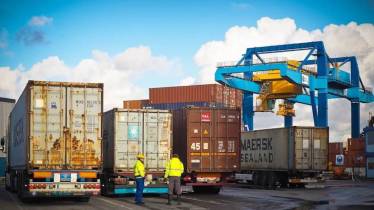By: Raaja Kanwar – Chairman & Managing Director, Apollo International Limited & Apollo Supply Chain
The logistics sector, often referred to as the backbone of any economy, plays a pivotal role in facilitating the movement of goods and connecting producers with consumers. In India, this sector contributes an impressive 14.4% to the nation’s GDP, making it a significant player in the country’s overall economic success. However, recent reports and statistics shed light on the challenges that the Indian logistics sector faces, particularly in terms of sustainability and high costs.
The World Bank’s report highlights that logistics costs in India are among the highest globally, accounting for nearly 14% of the country’s GDP, significantly surpassing the global average of around 8%. These exorbitant costs not only hinder trade and competitiveness but also burden
the economy as a whole. Moreover, the logistics sector’s environmental impact cannot be overlooked.
To address these pressing challenges, it is crucial for the logistics sector to adopt practices that not only reduce costs and environmental impact but also enhance efficiency and competitiveness.
Prioritising Electric Vehicles and Alternative Fuels
By prioritizing the use of electric vehicles (EVs) powered by batteries and green hydrogen, businesses can promote sustainable logistics. These alternatives offer cost-efficiency, lower emissions, and higher efficiency. However, the adoption of EVs in India faces obstacles such as inadequate charging infrastructure and high initial purchase costs. Overcoming these hurdles necessitates investment from both the public and private sectors in establishing a widespread network of EV charging stations. Additionally, the government can incentivize the adoption of EVs through subsidies and other initiatives.
Furthermore, India can cater to the demand for eco-friendly transport by encouraging the use of alternative fuels like ethanol and biodiesel. These renewable energy sources significantly reduce emissions compared to conventional fossil fuels, contributing to a greener transportation landscape. Domestic production of biofuels not only curtails reliance on imported oil but also boosts energy security.
Promoting Multi-Modal Connectivity for Sustainable Transport
Road freight accounts for a significant portion (95%) of greenhouse gas emissions in the freight sector, whereas rail transport emits considerably fewer emissions, producing only about one-fifth per ton-kilometer. With the Indian Railways aiming to become net-zero carbon emitters by 2030, leveraging rail transport presents a valuable opportunity to reduce carbon dioxide and other greenhouse gases by 7.5 million tons annually.
The Indian government has taken proactive steps to foster multi-modal connectivity and green logistics through initiatives like the National Logistics Policy. This policy aims to construct an integrated logistics network that maximizes the utilization of rail, water, and air transport, thereby alleviating the strain on road transportation. Additionally, the Sagarmala Program focuses on enhancing ports and coastal shipping to boost the share of water transport. Private sector involvement is pivotal in shifting logistics operations from road to rail and water transport, reducing dependence on traditional roadways.
Smart and Sustainable Warehousing
Beyond transportation, warehousing and distribution centers have a significant environmental impact. These facilities consume substantial amounts of energy for lighting, heating, and cooling, and generate waste from packaging materials and other activities.
Businesses committed to adopting sustainable practices in their warehouses and distribution centers can invest in energy-efficient lighting systems, such as LED lights, and implement insulation to minimize energy consumption. Opting for sustainable packaging materials, such as biodegradable or recyclable options, helps reduce waste and conserve resources. Furthermore, implementing waste reduction and recycling initiatives, like separating recyclable materials and composting organic waste, not only contributes to sustainability but also provides financial benefits through reduced waste disposal costs.
Tech Investment in Logistics: A Path to Long-Term Success
Companies that embrace technology to enhance their logistics operations gain a strategic advantage in the market, unlocking long-term success. By adopting the latest innovations in logistics technology, businesses can optimize operational efficiency, reduce costs, and provide customers with faster and more reliable delivery services.
AI-driven tools and platforms play a vital role in planning the most efficient routes, minimizing fuel consumption, and reducing emissions. By employing such technologies, businesses can contribute to lowering the carbon footprint of their logistics operations while achieving cost savings.
In conclusion, promoting sustainable logistics in India requires active participation and shared responsibility from both the private and public sectors. Adopting a holistic approach that encompasses various aspects of the supply chain, including the implementation of green technologies, waste and emissions reduction, promotion of alternative fuels and modes of transport, and adoption of circular economy practices, is crucial for making logistics more sustainable. Collaboration among stakeholders is paramount to developing sustainable policies, research and development, and knowledge sharing. Together, the private and public sectors can drive significant changes in the logistics sector, paving the way for a more sustainable future for India.
Disclaimer: Views expressed are personal and do not reflect the official position or policy of Financial Express Online. Reproducing this content without permission is prohibited.
